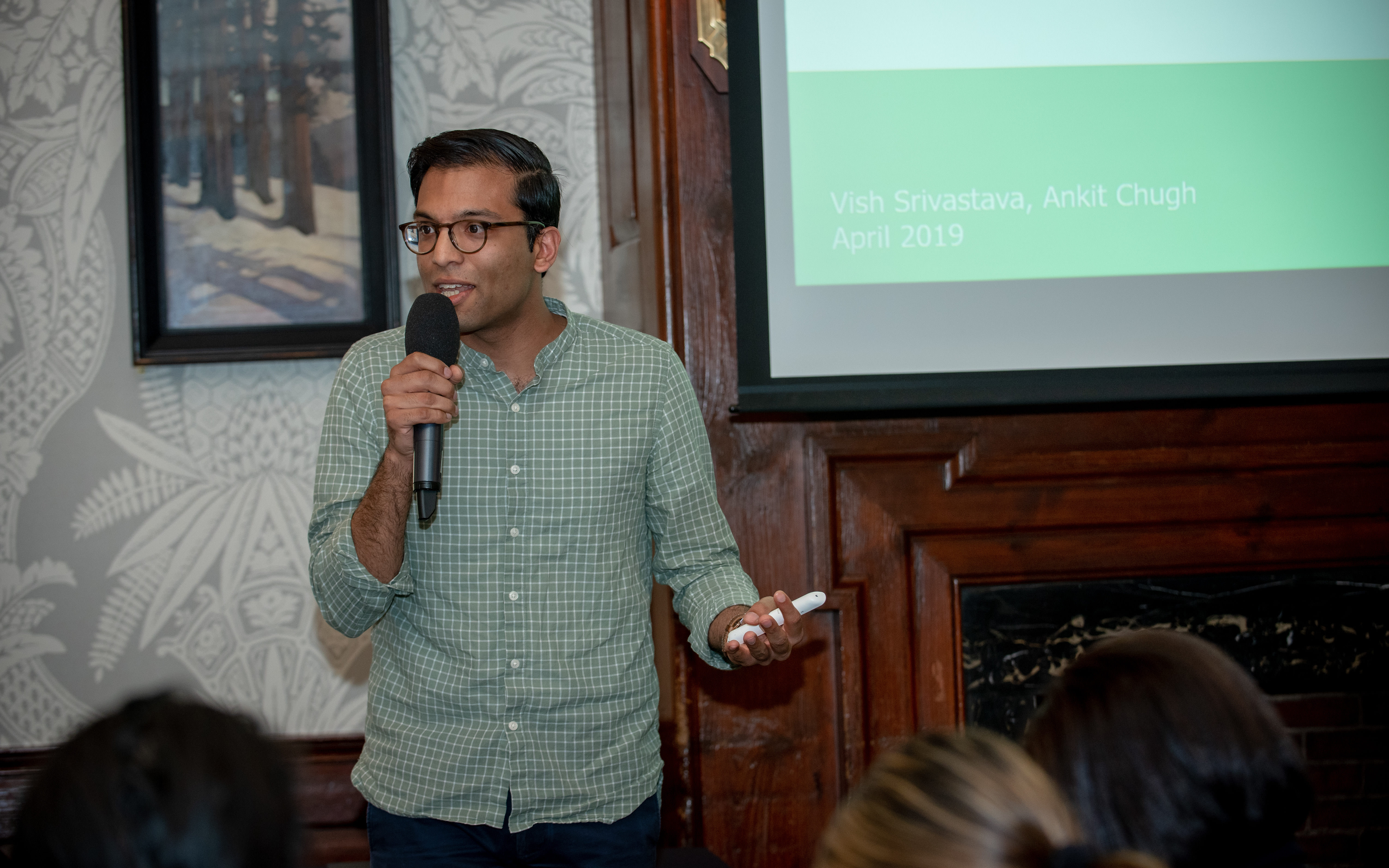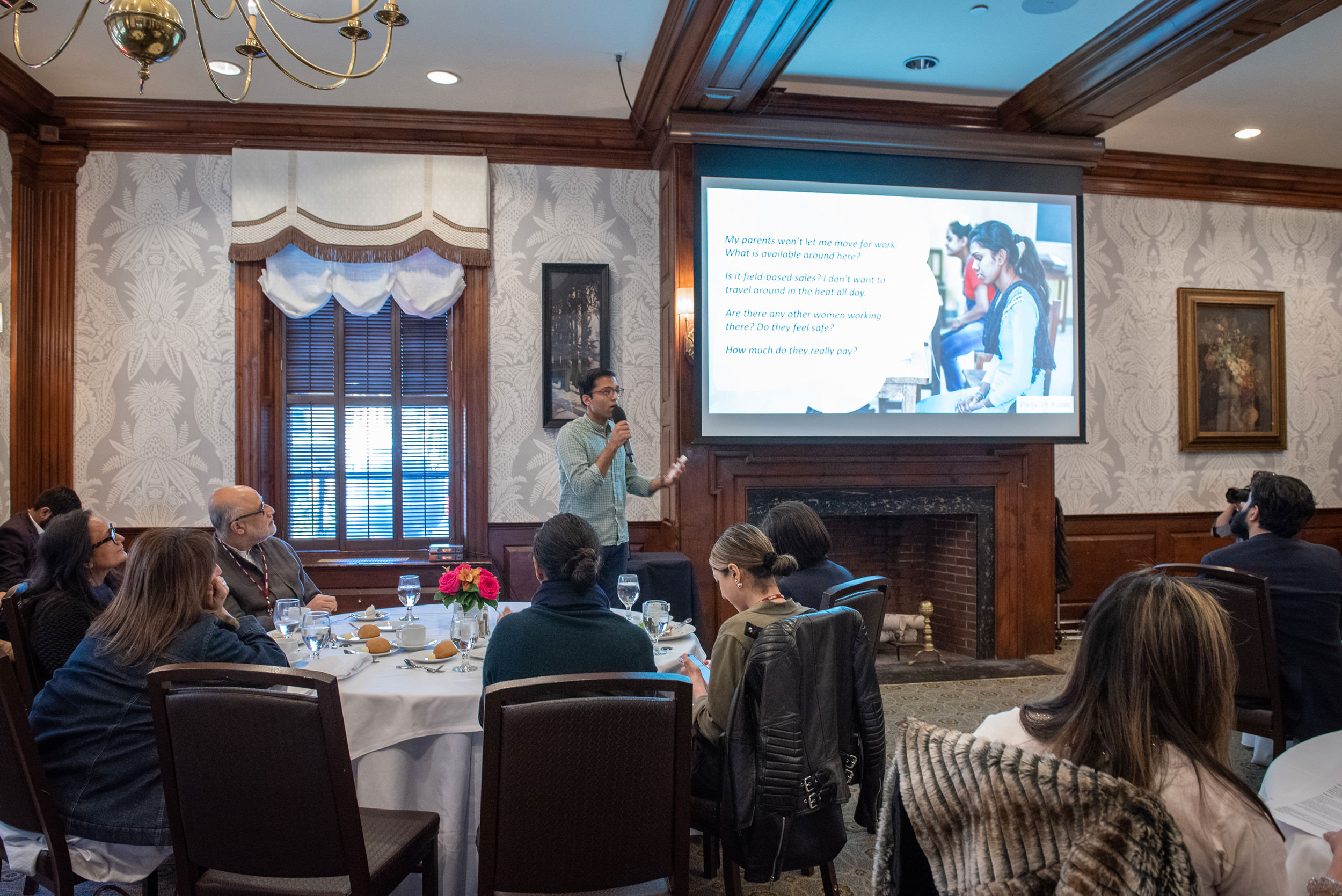
Vish Srivastava discusses the employment app Meet during the Mittal Institute’s annual Seed for Change competition.
“The pathway from education to employment for Indian youth is, simply put, failing them,” says Vish Srivastava, co-founder of India’s newest employment app, Meet. Alongside co-founder Ankit Chugh, the two have built a platform to address the difficulties that India’s job market presents, with 30% of Indians aged 15-29 either unemployed or not enrolled in an educational institution or skills training program.
Vish Srivastava, a second-year Master in Design Engineering student at Harvard Graduate School of Design and the School of Engineering and Applied Science, brings an extensive background in business strategy, digital product development, and social sector solutions, and is responsible for Meet’s product design and development. Ankit Chugh is trained as an engineer and is an experienced edtech social entrepreneur based in Delhi, and is responsible for Meet’s growth and operations.
With the grant provided by the Seed for Change competition, the Meet team will renew their partnership with a local software development firm in Lucknow to continue building the product. “As we scale up our team and user base, our technology platforms costs are also increasing, which this grant will also help with. We depend on a variety of technologies to run Meet, including Heroku, G Suite, Google Maps, Github, and Intercom,” says Vish Srivastava.
Below, Srivastava explains what Meet is, the inspiration behind it, and its potential impacts on India’s job market.
What Is Meet?
Meet is an employment app that connects verified employers and job-seekers, providing both with trusted information, such as reviews, job openings, and profiles to support better matching. We are building this product in Lucknow, Uttar Pradesh (UP), India in partnership with the NGO Medha to launch a pilot, test the hypothesis, and eventually scale this employment platform to have large-scale impact in UP. We launched our pilot in April 2019 and now have over 100 active pilot users, with whom we engage on a weekly basis to get their feedback and continue to iterate on the Meet product.

Vish Srivastava discusses the employment app Meet during the Mittal Institutes annual Seed for Change competition.
This platform is differentiated from its competition in two fundamental ways:
1. Verification: In conducting research with job seekers in Lucknow, we learned that existing job boards like Naukri and Babajobs are plagued with fraud and misinformation. To avoid falling into the same trap, Meet staff verify every review and job posting submitted to the platform, and conduct extensive vetting of both employers and job-seekers before they are allowed to become active users on the platform. Meet’s company profile information, reviews, and job postings can be trusted.
2. Youth-oriented: Meet has been meticulously tailored to its target audience. While LinkedIn, Glassdoor, and other similar platforms are in English and create generalized features for their global audience, Meet is written in Hinglish (the preferred language of communication amongst youth in UP, largely driven by new mediums such as WhatsApp) and has been co-designed with the youth themselves. Furthermore, specific design decisions, like which categories are used for reviews and the types of filters used to discover employers, have been made specifically for youth in UP.
Chris Turillo and Rohit Nayak, Co-Founder and VP Partnerships of Medha, respectively, are our active advisors, and help us shape the company, connect us to Medha’s data when appropriate, and provide their rich insights into the problems we’re working to solve. In the last month we have hired our customer support, content management, and operations teams. We are proud to have built a passionate team of five employees in Lucknow, four of which are women. We are fortunate to have several additional advisors as we build and scale Meet, including Jim Larson (Partner at BCG), Shalu Umapathy (Managing Director at IDEO.org), Jock Herron (Harvard GSD), Krzysztof Gajos (Harvard SEAS), and Emmerich Davies (Harvard GSE).
Why Create This App?
The challenges in the job market for youth in India are significant. There is a profound misalignment between the education and employment systems in India and the needs of its youth. According to the OECD, 30% of people aged 15-29 in India are not in employment, education, or training, and according to Aspiring Minds, 47% of India’s graduates are not considered employable in the knowledge economy. The pathway from education to employment for Indian youth is, simply put, failing them. Paradoxically, the picture is not much better for employers. ManpowerGroup says that 56% of worldwide employers report talent shortages. And even when they can fill their open positions, they face difficulties retaining employees, and experience very high employee attrition rates. These statistics paint a dire picture and represent a failure of the job market for both job seekers and employers.

Vish Srivastava answers questions from the judges at the annual Seed for Change competition.
The idea for Meet germinated through initial discussions between Vish, who aimed to work in the education space in India for his second-year project as a part of Harvard’s Design Engineering program, and Medha’s co-founder Chris Turillo. This resulted in a fruitful partnership in which we have conducted several rounds of research in Lucknow and have built and launched our company.
One of our early inspirations for Meet was sparked from a conversation with a man named Krishna, a retail floor associate at an apparel store in a large mall in Lucknow. He shared with us that all of the workers in the mall meet for chai every day and exchange information about their salaries and working conditions. Armed with this information, all the workers were able to negotiate better pay and switch jobs to a different store if it was a better fit.
Wouldn’t it be amazing to recreate this chai break on an online platform that allows job-seekers and employees to share information and help each other? Krishna’s story inspired the Meet logo: a chai cup to represent the free exchange of information to benefit all.
What Are Its Potential Impacts?
We believe Meet has the potential to drive significant impact in the labor markets of tier II/III Indian cities. Our theory of change is that a free and transparent flow of information will:
- Lead to improved labor practices, increased incomes, and better job satisfaction
- Democratize information for historically disadvantaged groups (e.g., along gender and socioeconomic segments)
- Create and sustain social connections by enabling peers to share mutually-beneficial information.
Together, Srivastava and Chugh are breaking down barriers in the job market commonly faced by India’s youth, looking to bring transparency and accuracy to an app that will hopefully increase trust for both job seekers and employers.
